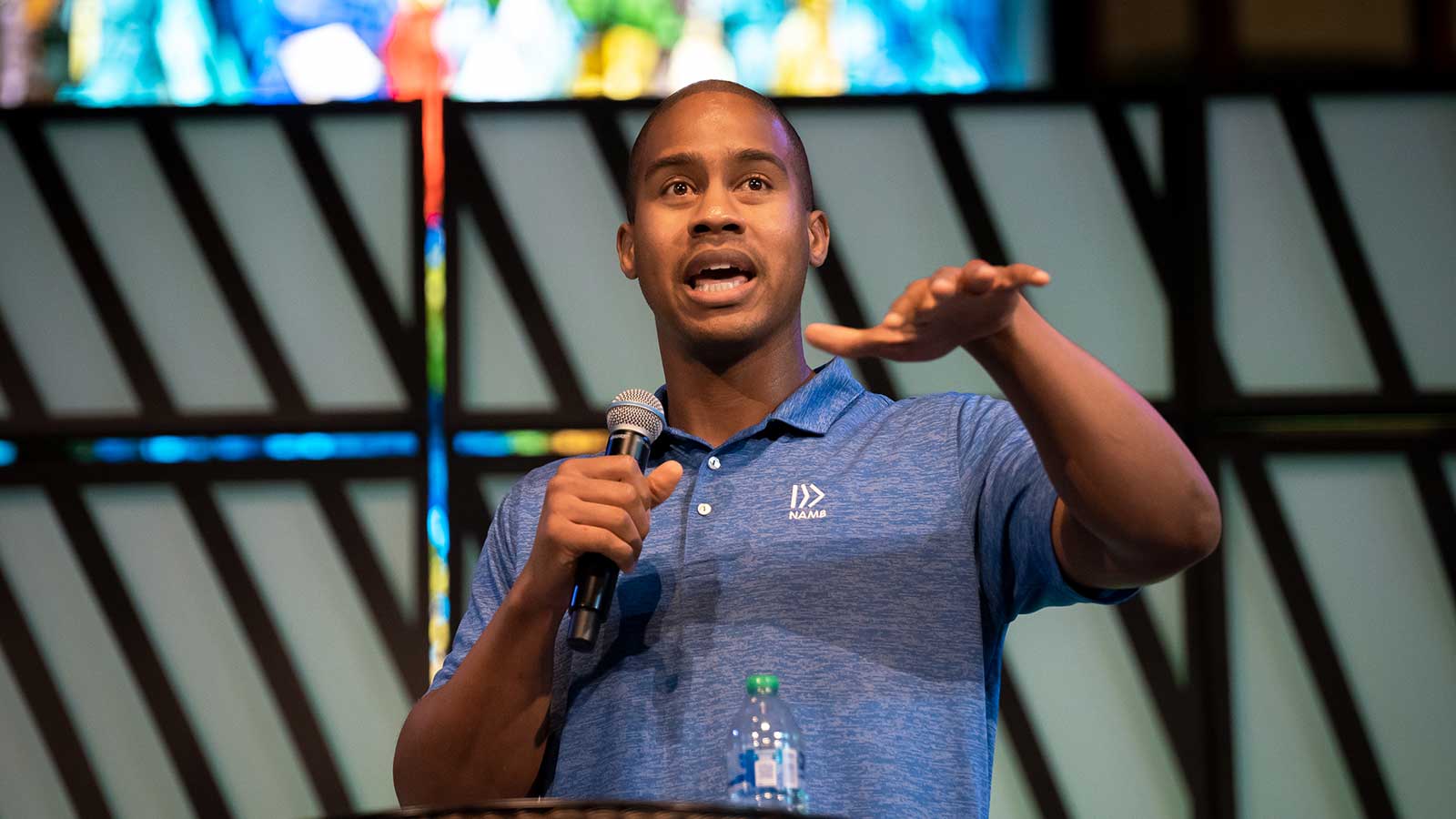Wright Delivers First Chapel Message of the Fall Aug. 18
August 18, 2021
Abraham Wright, teaching pastor at Council Road Baptist Church in Bethany, Oklahoma, delivered the chapel message Wednesday, Aug. 18, inside Raley Chapel’s Potter Auditorium on the OBU campus in Shawnee. The chapel was the first service of the fall chapel series and was the first of two Fall Challenge chapel services. The second Fall Challenge service will take place Friday, Aug. 20, and will feature Dr. James Swain, associate executive director for church relations of Oklahoma Baptists.
The first chapel messages of the semester at OBU are traditionally known as the “Fall Challenge.” They take place as part of Welcome Week, where students are welcomed and oriented to life on the OBU campus.
Wright was born and raised in Oklahoma, graduating from Southeast High School in 2002. He played football at the University of Colorado, finishing his senior year first-team All-Big 12 while finishing second in the nation in sacks. He was drafted into the NFL in 2007 by the Miami Dolphins and released after his rookie season. He has worked with the OU football team as a chaplain and has been in full-time ministry since 2010. He earned a master’s degree in apologetics, which seeks to give credible answers to Christianity.
Wright’s message centered on the question, “What’s the big deal about Jesus?”
“There has been no person affect our world like Jesus. Even if you don’t believe in him, you have to admit that He has impacted our world like no other. Even historians that don’t believe that Jesus was the son of God still acknowledge the impact He has had on the world.”
Wright then discussed several points of evidence regarding the life of Jesus and the truth of his being the son of God.
“The first point of evidence I want to look at it when it comes to Jesus is time,” he said. “We tell time through Jesus. B.C. means ‘Before Christ.’ A.D. is a Latin phrase, Anno Domini, and it means, ‘In the year of our Lord.’”
“We still tell time through Jesus coming to this earth. I want you to think about that. Even if you don’t believe that He was the son of God, you can’t deny his impact. We don’t tell time through Buddha or Muhammad or through other people that have walked this earth. We tell time through Jesus.”
He then discussed how other religions view Jesus and how they acknowledge him along with his impact. He likewise discussed prophecies and how Jesus fulfilled all of the Messianic prophecies of Scripture.
“There are so many prophecies that give precise predictions about Jesus hundreds of years before He fulfilled them. The Bible has many precise prophecies that have been fulfilled by Jesus.”
He then covered some of the prophecies Jesus fulfilled, including his birth in Bethlehem, his calling out of Egypt, his burial as the suffering servant of God in a rich man’s tomb, that God’s chosen one would have his garments gambled for, and more. He also noted how these prophecies were given hundreds of years before Jesus was born.
He then cited a mathematician, Peter Stoner, who calculated the odds of only eight of the prophecies about Jesus being fulfilled in one person as being one in 100 quadrillion. He used the mathematician’s illustration that this would be the same chance as stacking silver dollars across all of the state of Texas, in stacks two feet high, marking one of those silver dollars, and then having someone select only one out of the entire state. The odds of it being the same marked silver dollar would be the same one in 100 quadrillion as the odds that Jesus would have fulfilled only eight of the Old Testament prophecies.
He then shared that this same mathematician calculated the probability of one person fulfilling 48 of the prophecies about the Messiah as being one in 10 to the 157th power, which is 1 with 157 zeros. Yet, Jesus actually fulfilled far more prophecies than this. After reviewing the evidence and calculating these odds, Stoner wrote, “Any man who rejects Christ as the son of God is rejecting a fact proved perhaps more absolutely than any other fact in the world.”
Wright then discussed the resurrection of Jesus.
“Jesus’s resurrection from the dead is essential to the truth of Christianity. If Jesus didn’t rise from the dead, then Christianity is not true, even if we show fulfilled prophecies, even if we admire his ethical teachings that have shaped the western world in many ways, it’s still false. But, if Jesus did rise from the dead, then Christianity is true.”
He went on to discuss evidence for 12 historical facts surrounding the death and resurrection of Jesus.
“These historical facts,” he said, “help us see that the resurrection of Jesus from the dead is not just rooted in the Bible; rather, it’s also rooted in history even among unbelieving historians. They acknowledge those facts surrounding the resurrection. It helps set the stage that this really happened.”
He concluded by discussing the evidence of Jesus as the son of God due to changed lives, examining the actions of the disciples. He noted that they were in a position to have known the truth if the resurrection were not real, yet, they ultimately sacrificed their lives for proclaiming Jesus as the son of God along with the truth of his resurrection.
“They didn’t die for a lie,” he said. “They went from cowards that fled when Jesus was arrested to people that would be willing to die brutal deaths. Their changed lives help prove Jesus’s claims, and I believe that your changed lives can help people find Christ at this university.”
